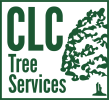We’ve shared our views on mulch here on the blog before. Mulch helps deter weeds, keeps the soil moister and cooler in summer, adds aesthetic appeal, and creates a barrier between your landscaping and the equipment you use to maintain it. CLC Tree Services chooses natural versus coloured mulch hands down. When it comes right down to it though, there are far more options to choose from.
Mulch Options for the Garden

Backyard composters are a great way to create free compost
Compost
- PRO: Free (if you’ve got a compost pile – or relatively cheap if you purchase it through the city), adds nutrients back into the soil, rich, dark compost is visually appealing, helps alkaline soil (compost is slightly acidic)
CON: Needs to be reapplied frequently. Doesn’t suppress weeds.

Grass Clippings
- PRO: Free, breaks down rapidly, adds nitrogen back into the soil
- CON: Needs to be reapplied frequently (lay it on thin & reapply as necessary to prevent clippings from rotting [and stinking!]). Nitrogen breaks down quickly once grass is cut. Not as visually appealing. If the lawn has been chemically treated, it is inappropriate for mulch purposes.

River stones are visually appealing, but are difficult to remove or plant in
Gravel/River Stones
- PRO: Stones don’t break down, so don’t need to be constantly reapplied, and are aesthetically pleasing.
- CON: Unless you have a handy supply of river stones, the costs can add up. You still need to maintain them (rake leaves and readjust rock placements), plus they hard to dig in (for planting or weeding). No nutrients are added to the soil.

Leaves are a naturally occurring byproduct of trees
Leaves
- PRO: Free, break down fairly quickly, adds nutrients back into the soil
- CON: Requires effort to shred the leaves before applying. If you have diseased foliage (like tar spot or anthracnose), you should dispose of the leaves to prevent spreading disease.

Needles and cones are natural byproducts of coniferous trees and make a great mulch choice
Pine/Spruce/Cedar Needles
- PRO: Free (if you have a supply of evergreen needles handy), prevents weed growth and seed germination (good or bad depending upon whether you planted the seeds or not)
- CON: Requires a lot of needles to get adequate coverage, affects pH level of soil (very acidic, makes it alkaline)

Straw bales are great for bedding animals, hay bale mountains, crafts AND mulch!
Straw
- PRO: Takes longer to break down then leaves or grass clippings (lasts longer), aesthetically appealing, adds nitrogen back into your soil, is an organic medium, is relatively inexpensive
- CON: Often contains weed seeds (which increases your weeds), attracts mice, voles and other small rodents, and unless you live on a farm, will need to be purchased

Shredded bark or wood chips make for one of your best mulch options
Shredded Bark/Wood Chips
- PRO: Adds nutrients back into the soil, suppresses weeds, keeps soil warmer in winter/cooler in summer, improves water retention
- CON: Needs to be reapplied every 1-3 years depending upon size, more expensive than leaves (unless you have a wood chipper)



You must be logged in to post a comment.